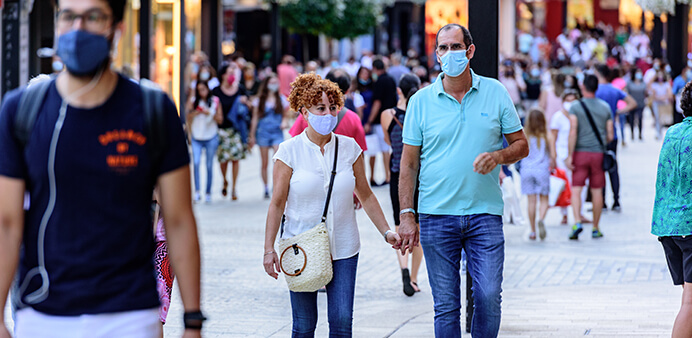
The COVID-19 pandemic was more than the world bargained for. It was totally unexpected and downright overwhelming. Nothing like it has ever been seen, or at least not by this generation.
The phrase “experience is the best teacher” comes into play in these situations. So, as in the cases of other pandemics, COVID-19, too, has taught us a lot. Lessons that we, with broken hearts, should not forget, lessons that the younger generation should know. What are some of these lessons?
The phrase “health is wealth” is not just a mantra or a popular slogan; it’s an actual and factual concept. The health of a nation plays a big role in how that nation functions in other areas.
COVID-19 showed us that the wealth of a nation will diminish fast if the health of the populace is affected. Therefore, it would be important to pay close attention to our nation’s health.
Health transcends beyond the absence of physical ailment. The pandemic helped us understand the scope of WHO‘s definition of health as not necessarily the absence of disease or infirmity. The COVID-19 pandemic came with strict lockdown measures across the country. People lost jobs, companies and countries lost money. People became poorer and hungrier. Food was scarce, and people spent all they had saved trying to stay alive.
Mental illnesses such as depression rose considerably. This, in turn, played a role in the rise of unhealthy lifestyles and an increase in substance abuse and addiction. This, in turn, led to an increased risk of illness and its impact on productive human years.
So in all of our endeavors and as we go about our everyday lives, we should not forget that the nation’s stability lies in its health. So we should all play our parts in ensuring that we stay healthy.
During the pandemic, we got all kinds of health advice and guidelines. We were asked to wash our hands, put on a face mask, wear an air purifier necklace, sneeze into our elbow pits (front of our elbow), etc. As surprising as it may sound, these health guidelines have always existed.
Some guidelines given to us during the COVID-19 pandemic are simple Health guidelines we should adhere to in our everyday life. Unfortunately, it took a pandemic for us to realize that. If we do not keep to the basis of sanitary practices, we will again be forced by pandemics to do so.
Your hands are never too clean, so always wash your hands. Wear a mask, especially when in a new environment. These simple hygiene practices have a way of preventing illnesses. Healthy living is a daily thing; we saw how those who had better health indices fared better even when infected by the virus.
Do you still wear your face mask, practice good cough and sneezing etiquette, or practice handwashing? If these simple hygiene practices are adhered to strictly, a pandemic similar to COVID-19 may not take the world by surprise again.
The COVID-19 pandemic exposed a lot of inadequacies in health care sectors around the world, especially in middle and low-income countries. It showed how caring for the sick can be a tough job, both physically and mentally.
Health practitioners saw more COVID-19 cases than they had anticipated. With time, most of them became sick themselves; others had mental breakdowns; and some died. Hospitals became overcrowded, and more people got ill daily, which added to the severity of the situation.
Because of how things were, people with other illnesses were quickly discharged from hospitals to create space for COVID-19 patients. Surgeons and radiologists were made to attend to patients with COVID-19. This made them pay less attention to patients who may need their services.
Over time, these neglected patients, who didn’t have COVID-19 before, became ill. Most of them had terminal or chronic illnesses and were thus immunocompromised. Most of them had worse symptoms because of the initial neglect and their immunocompromised state, and some died.
The COVID-19 pandemic has taught us to appreciate our health officials. It has taught us that their jobs go beyond what we may see or claim to know. They, too, are humans and can struggle with the same health issues that they treat. That they also sacrifice a lot for the well-being of a Nation. To a great extent, they hold the health of a nation together.
COVID-19 exposed how overwhelming the act of caring for the sick can be for health officials. This, in turn, shed more light on how much less effective doctors, nurses, pharmacists, etc., can be when overwhelmed. COVID-19 taught us to value health officials more for what they do. This is both in terms of maintaining individual, community, and global health. The pandemic proved how everything else could come to a halt if they failed at their job.
The world may see another pandemic, maybe in our lifetime or long after we have gone. The pandemic has taught us great lessons that we should cherish for years to come. Having learned, we should all join efforts to uphold the significance of the lesson learned. Everybody has a role to play. “None is healthy until everyone is.” Everyone’s health should be both an individual responsibility and a responsibility shared by all. We saw how the fact that others were sick harmed us all.
The COVID-19 pandemic is not as vicious as it was, but people still get infected. To play our parts effectively, it is important that we adhere to simple hygiene guidelines and get tested often. An at-home test kit will get the job done for you.
Handstation.co.uk sells the perfect at-home test kit. The flowflex rapid antigen test kit or the healgen lateral flow covid-19-antigen testing kit will get the job done quickly.
Emir Limam – E11 Group B.V. Netherlands – Fraudster
24 May 2023When to Take a Test After Covid Exposure?
30 January 2023A Rapid Antigen Test vs a Lateral Flow Test for Covid-19
30 January 2023